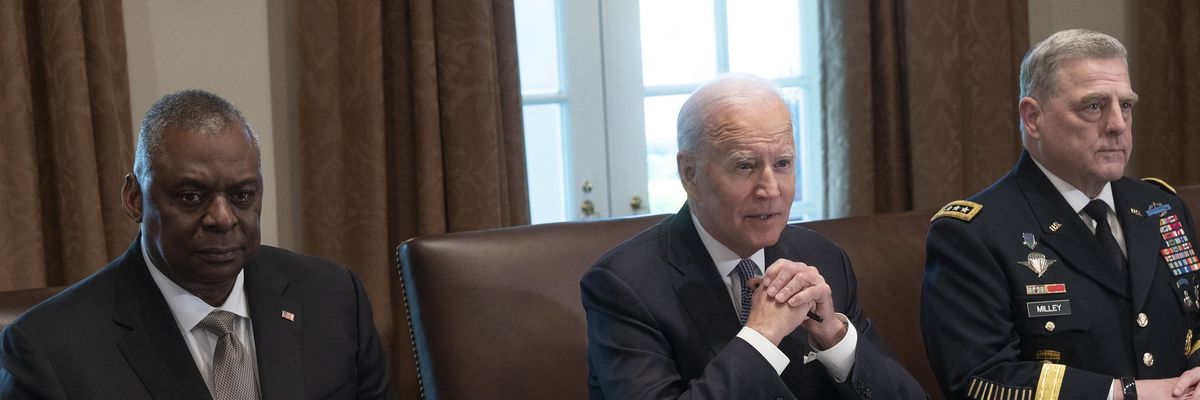In his State of the Union Address on February 7, President Biden once again promised Ukraine that “America . . . will stand with you as long as it takes.”
But, privately, one year into the war, the Biden administration appears to be telling Ukraine that “as long as it takes” may be running out.
One week after the State of the Union, The Washington Post quoted a senior administration official as saying that “we will continue to try to impress upon them that we can’t do anything and everything forever.”
The senior official said “continue” because in January CIA Director William Burns met secretly with Ukrainian President Volodymyr Zelensky and told him, according to a Washington Post account, that “at some point assistance would be harder to come by.” People familiar with the meeting said Zelensky walked away from the meeting with the impression that he could rely on U.S. assistance through the summer but that he was “less certain about the prospects of Congress passing another multibillion-dollar supplemental assistance package as it did last spring.”
That timeline was reinforced by the Post’s reporting that “Biden and his top aides . . . warn that the political path will get tougher once Ukraine has exhausted the current congressional package, which could happen as early as this summer.”
The senior official redefined the Biden promise, saying “As long as it takes’ pertains to the amount of conflict. It doesn’t pertain to the amount of assistance.”
The timeline suggests the urgency of the moment. The Post reports that “The critical nature of the next few months has already been conveyed to Kyiv in blunt terms by top Biden officials — including Deputy National Security Adviser Jon Finer, deputy secretary of state Wendy Sherman and Undersecretary of Defense Colin Kahl, all of whom visited Ukraine last month.” The “coming months” will be critical for “Ukraine to retake as much territory as possible . . . before sitting down with Putin at the negotiating table.”
That the goal is to take back “as much territory as possible” sounds like a concession that Kiev may not achieve its goal of reclaiming all of its territory. At the end of the war, Ukraine will be divided. “The frank discussions in Kyiv last month,” The Post reports, “reflected an effort by the Biden administration to bring Ukraine’s goals in line with what the West can sustain.” That too is a recent refrain. In November, National Security Adviser Jake Sullivan told Zelensky’s team to “start thinking about its realistic demands and priorities for negotiations, including a reconsideration of its stated aim for Ukraine to regain Crimea.”
A divided Ukraine will likely mean a postwar Ukraine without Crimea. “U.S. intelligence officials have concluded . . . that retaking the heavily fortified peninsula is beyond the capability of Ukraine’s army.” That sobering assessment, the Post reports, “has been reiterated to multiple committees on Capitol Hill over the last several weeks.”
The New York Times also reported last month that “the Biden administration does not think that Ukraine can take Crimea militarily.” And Chairman of the Joint Chiefs of Staff General Mark Milley has said that “for this year, it would be very, very difficult to militarily eject the Russian forces from all —every inch — of . . . Russian occupied Ukraine.” Even Kyiv may accept “that regaining Crimea by military force may be impossible.”
The acceptance by the Biden administration that, at the end of the war, Ukraine will be divided is also reflected in a Newsweek report that Burns secretly travelled to Moscow last month with a peace plan that would end in Russia keeping 20 percent of Ukraine’s territory.
The report, which was denied by the White House, may or may not be true. But it may have caught wind of the mood in Washington. Burns may have explored the idea of a peace plan that involved Russia withdrawing to its pre-February 24 borders, an idea that had been suggested by Secretary of State Antony Blinken in December. That would leave Russia in possession of Crimea and parts of the Donbas.
The report suggests again that division of Ukraine may be the only way forward after a realistic appraisal of the military facts on the ground. Conceding the partition of Ukraine as part of a negotiated settlement would be consistent with the settlement Russia and Ukraine had reportedly tentatively agreed to in Istanbul in April 2022 that had Russia maintaining possession of Crimea and part of the Donbas. It would also be consistent with historical referendums taken in the Donbas and Crimea.
The Biden administration appears to understand that "as long as it takes" has an expiration date and that Kiev will have to accept a divided Ukraine with Crimea lost to Russia and parts of the Donbas outside of its control. The tragedy is that the map would have looked similar had a negotiated settlement been agreed to in the first weeks of the war, or even before the war began.
















